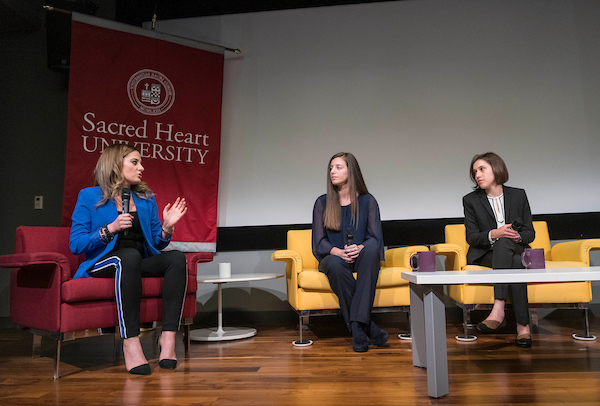Hybrid graduate programs have joined traditional face-to-face classroom and online distance learning as a respected third method of teaching and learning. Hybrid graduate degrees at Sacred Heart University have become extremely popular because they blend the convenience of attending online classes with traditional classroom instruction that allows students to explore topics in much greater depth.
Not only do these degrees offer flexibility and an unmatched learning experience, several of Sacred Heart’s graduate-level hybrid degrees deliver exceptional returns on investment (ROI).
Four Leading Hybrid Graduate Programs at SHU
A graduate degree is often the best preparation you can receive as you advance your career. Most graduate programs tout a healthy balance of classroom learning and hands-on training and real-world experience. In a hybrid graduate program, you can access these benefits, while retaining the flexibility you need to continue working or attending to personal obligations — a true win-win. Let’s look at each of the following hybrid graduate programs at Sacred Heart, and explore their professional ROI.
Family Nurse Practitioner | Doctor of Nursing Practice
Master of Science in Industrial/Organizational Psychology
Doctor of Business Administration in Finance
Family Nurse Practitioner | Doctor of Nursing Practice
Upon completion, this unique program awards a Doctor of Nursing Practice (DNP) degree with a Family Nurse Practitioner (FNP) certification. This program allows students to earn nursing’s most advanced degree, the DNP, and to embark on a career providing healthcare to families over their lifetimes.
With the aging of the U.S. population, the American Association of Medical Colleges (AAMC) has predicted that, by 2030, the number of physicians will fall 120,000 short of what’s needed to avoid long wait times in both primary and, especially, in specialty care areas. The DNP degree with its FNP certification addresses that shortage, as it trains nurses to deliver healthcare to entire families over their lifetimes.
Today, 22 states allow FNPs full practice autonomy, meaning they do not need supervision from an M.D. or D.O. as they work with families to diagnose, treat, and manage illnesses as well as guiding patients to develop healthful practices.
It’s noteworthy, too, that in 2018, the National Organization of Nurse Practitioner Faculties (NONPF) reported it would be upgrading their entry-level nurse practitioner education programs from the Masters in Nursing to the DNP by 2025 — lending further importance to this degree program.
Students who thrive in this hybrid program want to serve families throughout their lifetimes, and most work in non-emergency, ambulatory environments that give them time to build close, personal relationships with patients. If you are seeking a degree that lets you care for diverse populations, gives you autonomy, and generally allows for practice without supervision — then, a DNP is the degree to consider.
Ready to learn more about the FNP-DNP degree program and a career as a Family Nurse Practitioner? Download our resource: Do You Want to Advance Your Nursing Career?
Student Outcomes
At Sacred Heart, the DNP program consists of 69 credit hours, which students usually complete over three years, although some students opt to stretch the program to a fourth year. Courses are offered full or part-time and hybrid coursework only requires students to come to campus an average of 6 days per semester.
A BSN degree is required for entry into the program. Upon completion, students will have mastered eight foundational knowledge domains (summarized here) that give DNPs a far deeper perspective on delivering family healthcare than the MSN degree.
Career Outlook and Professional ROI
According to the Bureau of Labor Statistics, the market for advanced practice RNs, which includes Family Nurse Practitioners, is excellent and will grow 45 percent by 2029 as demand for advanced practice nurses climbs from its current 211,000 to around 322,000. With many jobs idling along at five percent or less annual growth, the DNP degree at 45 percent is a true outlier that bodes extremely well for DNP-prepared job seekers.
DNPs earn on average $42,000 more annually than registered nurses with a BSN degree — $113,930 compared to $71,730. According to a 2015 Medscape salary report, DNPs also earned more than their MSN-trained colleagues bringing in $9,000 more on average per year.
Master of Science in Industrial/Organizational Psychology
Over the last decade, many businesses and workplaces have invested significant resources in the policies and procedures that help guide the employee hiring and retention process. Especially with a rise in work-from-home, businesses are eager to keep their employees happy, healthy, satisfied, and productive while also fostering employee innovation, a formula for business success.
All of these objectives can be accomplished by using the psychological principles found in the field of industrial/organizational psychology.
The MS in Industrial/Organizational Psychology at Sacred Heart equips students to help organizations increase efficiency and employee satisfaction using these principles. Students will learn to apply a broad range of interdisciplinary and multidisciplinary knowledge and skills in multicultural and global settings, and engage in and apply evidence-based research in professional settings.
Learn more about the field of I/O Psychology and Sacred Heart’s master’s degree in our comprehensive guide: What Can I Do with a Master’s in I/O Psychology?
Student Outcomes
The MS in I/O Psychology at Sacred Heart prepares graduates to engage in evidence-based research and to apply that knowledge, along with a broad range of interdisciplinary and multidisciplinary skills, in multicultural and global organizational settings. During an applied project, students will have the opportunity to practice the skills they learn in the classroom, in real-world settings.
Students can complete this hybrid master’s degree program in one calendar year with our unique cohort-style model. The degree is delivered in a series of six 8-week modules. Students will attend courses in the evenings twice per week, taking two courses per module, and in-course sessions will be supplemented with online work to accelerate completion time.
Career Outlook and Professional ROI
A master’s degree is generally the minimum requirement for entering professional practice in the field of I/O psychology. While earning an advanced degree will require additional time, effort, and resources, the expected return on this investment is well worth it. In 2018, the Bureau of Labor Statistics reported that the I/O psychology profession would be one of the fastest growing of the next decade, with an impressive 13 percent anticipated growth.
As of May 2019, the median annual salary is for I/O psychologists was $92,880, while the top 25 percent of earners made well above six figures.
Master of Business Analytics
In a 2017 joint report, PWC and Business-Higher Education Forum (BHEF) noted that 69 percent of the employers surveyed indicated a preference for job candidates with data science and analytics skills, while only 23 percent of educators surveyed noted they were producing such graduates.
At Sacred Heart our MS in Business Analytics program offers cutting-edge training in data management through a curriculum grounded in rigorous analytics and applied techniques. This means that our graduates enter the work force equipped with the skills that companies are seeking, making them competitive applicants and valuable additions to a professional team.
SHU’s program is unique because it offers training in PYTHON software, real-world experience through an applied curriculum project, and exposure to Artificial Intelligence software in the AI Lab. This graduate degree is offered in a hybrid format that meets online and on select Saturdays and weeknights. Admission to the program is on a rolling basis and there are multiple start terms throughout the year to accommodate a variety of schedules.
Student Outcomes
Throughout this 30-credit Master of Business Analytics program, students will learn from professors with years of real-world, corporate experience. Students choose from one of three concentrations, Business Analytics, Healthcare Data Analytics and Computer Science Analytics. During the applied practicum portion of the program, students work to solve an actual problem within a real company, a one-of-a-kind hands on training opportunity.
Students who graduate from Sacred Heart with a Master's in Business Analytics will be prepared for a wide variety of professional roles including: Analytics Manager, Data Analyst, Data Sciences & Advanced Analysts, Data-Drive Decision Makers, and Functional Analysts. With the skills acquired through this graduate program, students can secure these and many more roles within healthcare companies, professional service companies, defense, security, and technology companies, and more.
Career Outlook and Professional ROI
The outlook for business and financial analysts is excellent according to the Bureau of Labor Statistics. It predicts much faster than average job growth (11 percent) in the field through 2029 with 93,800 new jobs added. The 2019 median pay for analysts hovers at $85,260 nationally. Bottom line? Graduating with your Masters in Business Analytics from Sacred Heart will empower you to quickly land a high-paying job and make significant, data-backed recommendations in your company.
Doctor of Business Administration (DBA) in Finance
The Doctor of Business Administration (DBA) in Finance degree is a terminal degree. Graduates of the DBA program tend to specialize in areas including finance, economics, financial accounting, and similar fields. Some DBA grads move into education when they wish to teach or to conduct research, adding to the growing body of knowledge surrounding finance and its related fields. For those who wish to enter academia, most universities require a DBA or Ph.D. from its business professors.
This three-year, low-residency hybrid program enables finance and academic professionals to continue working full-time as they earn their degree.
Student Outcomes
Students admitted into the DBA in Finance program at Sacred Heart gain competence in advanced analytical software programs for statistical and econometric analysis and learn how to apply advanced models to issues such as risk management, corporate valuation, and related fields. With guidance from faculty experts, students learn to develop and defend scholarly papers and to follow ethical codes and standards that guide professional decision making.
Students with a DBA degree are eligible for many executive management positions. They may have earned the degree to move into a key management slot with their current employer or to seek new employment. Some choose to combine teaching and research to become business professors. Others may aim for jobs in virtually any industry as top executives, financial managers, or management analysts.
Career Outlook and Professional ROI
Because the DBA degree allows one to choose among many industries and positions, the growth projections, and salaries attainable largely follow the ebb and flow of the overall economy. The outlook for new jobs and wages vary over time and across industries, company size, and position. However, the Bureau of Labor Statistics projections for DBA graduates offers these median salary levels for a few of the most popular job titles:
- Business Professors at colleges, universities, and professional schools: $105,440
- Top Executives: $104,690 with 4 percent growth through 2029
- Financial Managers: $129,890 with 15 percent or much faster than average job growth in this area
- Management Analysts: $85,260 with growth projected at 11 percent through 2029
Find Your Perfect Hybrid Grad Degree Fit
Sacred Heart’s hybrid programs are designed for students who have work, family, or other obligations and cannot attend a traditional, fully-on-campus program. Students in these hybrid programs have the flexibility they need to complete their coursework through a variety of options including online lessons, evening and weekend classes, and asynchronous learning opportunities, to name a few. To learn more about what learning options your graduate program of interest offers, visit the degree’s program page.
Students in SHU’s hybrid programs find their learning opportunities meet or exceed traditional on-campus education. They quickly realize that learning doesn’t end when you leave the classroom, that every participant has an equal voice online, and that in-class sessions allow students to “dig deeper” into the subject matter when they collaborate with other students and faculty.
If you’d like to learn more about hybrid graduate degrees and the programs offered at Sacred Heart, access our comprehensive resource below or reach out to us for more information!









